Table of Contents
Engine Overheating in Mercedes-Benz C-Class W205: Causes, Diagnosis & Case Study with M274 Engine
Vehicle: Mercedes-Benz C-Class W205
Engine: M274 Turbocharged Inline-4
Customer Complaint: Engine Overheating
Introduction: Why Engine Overheating Matters
Engine overheating is one of the most alarming problems a driver can face. In modern vehicles like the Mercedes-Benz C-Class W205, overheating can cause serious engine damage, including warped cylinder heads, blown head gaskets, or even complete engine failure.
The M274 Engine, fitted in many W205 models, is known for its balance of performance and efficiency. However, like any engine, it relies heavily on a properly functioning cooling system. If coolant circulation or temperature regulation is compromised, overheating can quickly follow.
In this case study, we’ll walk through how a Mercedes-Benz C-Class W205 with the M274 Engine was diagnosed and repaired after repeated overheating issues. We’ll cover:
- – The customer’s complaint and symptoms
- – The diagnostic process
- – The root causes identified
- – The repair steps taken
- – Preventive measures for owners

Customer Complaint: Overheating and Warning Lights
The customer reported that the temperature gauge frequently climbed above the normal range, especially in traffic or during long drives. At times, the engine warning light illuminated, signaling potential overheating.
This was a clear indication that something in the cooling system was not functioning properly.
Step 1: Initial Diagnostics
The technician began with a short test using Mercedes-Benz Xentry Diagnostics. Surprisingly, the system showed no error codes related to the overheating.
This result ruled out common electronic issues, such as faulty sensors or ECU malfunctions, that might normally cause overheating warnings. Instead, the issue seemed to point toward a mechanical failure in the cooling system.
Step 2: Coolant Pump & Thermostat Valve Inspection
Even without fault codes, the technician continued with deeper checks. The electric coolant pump was tested using actuation mode in Xentry.
Findings:
- – The coolant pump failed to circulate coolant effectively.
- – A coolant leak was also detected near the thermostat valve.
Both of these components play critical roles:
- – Electric Coolant Pump → circulates coolant throughout the engine to maintain stable temperatures.
- – Thermostat Valve → regulates when coolant flows into the radiator for cooling.
If either fails, engine overheating becomes inevitable. In this case, both parts were compromised.
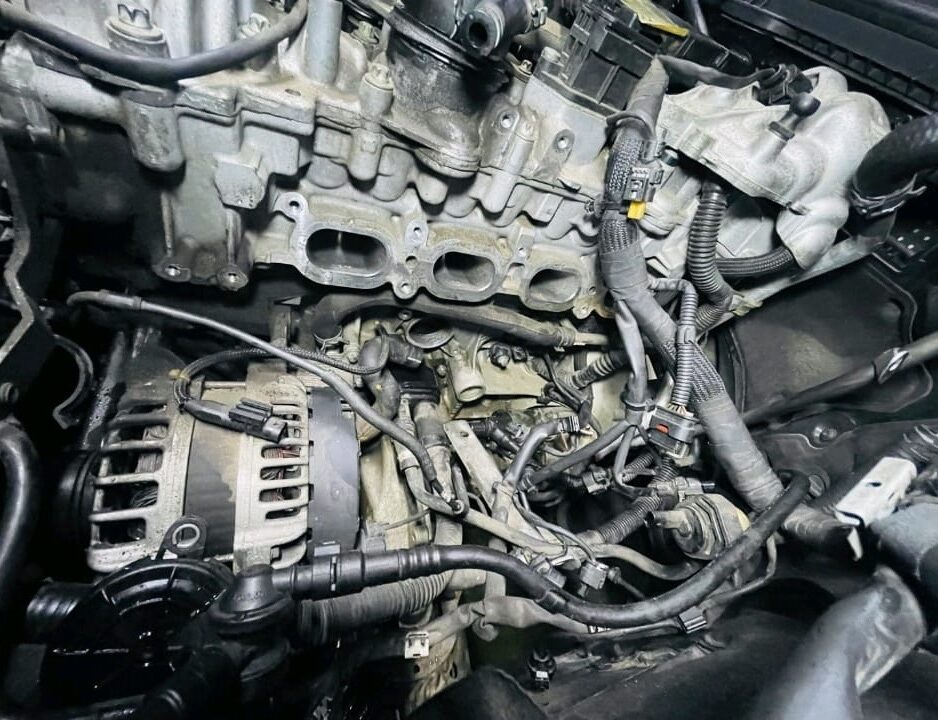

Step 3: The Repair Process
Once the faults were confirmed, the repair plan focused on replacing the defective components.
1. Coolant Pump Replacement
- – The faulty electric coolant pump was removed.
- – A new OEM pump was installed to restore proper coolant circulation.

2. Thermostat Valve Replacement
- – The leaking thermostat valve was replaced with a new unit.
- – Fresh gaskets were fitted to ensure a proper seal.
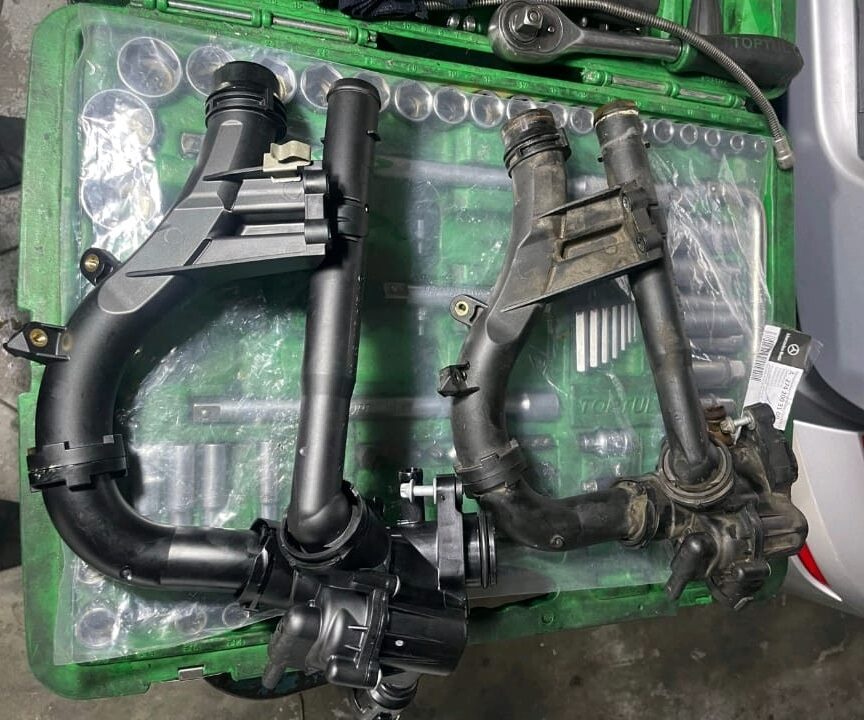
3. Coolant Flush & Refill
- – The cooling system was flushed to remove old coolant and contaminants.
- – Fresh coolant (Mercedes-Benz approved specification) was added.
- – The system was bled to remove air pockets.
Step 4: Testing the Cooling System
After the repairs, the technician ran a full system test:
- – The engine temperature remained within normal operating range.
- – The coolant circulation was verified as consistent and stable.
- – No further leaks were observed.
- – A test drive confirmed the vehicle could handle load and traffic without overheating.
The repair was deemed successful, and the “engine overheating” complaint was fully resolved.
Case Study Recap: Symptoms, Causes & Fix
| Symptom | Diagnosis | Repair Solution |
|---|---|---|
| Temperature gauge above normal | Faulty coolant circulation | Replaced electric coolant pump |
| Warning light for overheating | Coolant leak from thermostat | Replaced thermostat valve + gasket |
| No fault codes in ECU | Mechanical issue, not electronic | Visual inspection & pressure test |
Why No Fault Codes Appeared?
Many drivers assume overheating will always trigger fault codes. However, in this case:
- – The coolant pump failure was mechanical, not electronic.
- – The thermostat leak didn’t immediately trigger a sensor response.
This shows why manual inspections and pressure tests are just as critical as electronic diagnostics.
Can You Drive a Mercedes with Engine Overheating?
Absolutely not. Driving with an overheating engine can cause catastrophic damage within minutes. Possible risks include:
- – Warped cylinder heads (expensive repair)
- – Blown head gasket (common in overheated M274 engines)
- – Cracked engine block (requires engine replacement)
If you notice your temperature gauge rising or the engine overheating warning, pull over safely, switch off the engine, and seek professional help immediately.
Preventive Maintenance Tips
To avoid overheating in your Mercedes-Benz C-Class W205, follow these steps:
- 1. Check Coolant Level Regularly Ensure it stays between MIN and MAX on the reservoir.
- 2. Inspect for Leaks Look around hoses, radiator, and thermostat housing for signs of coolant residue.
- 3. Service the Cooling System Replace coolant at recommended intervals.
- 4. Monitor Temperature Gauge Don’t ignore small fluctuations.
- 5. Replace Components Before Failure Pumps and thermostats wear over time; preventive replacement avoids breakdowns.
Conclusion
This case study of the Mercedes-Benz C-Class W205 with the M274 engine demonstrates how engine overheating can occur even without fault codes. The root causes were a failed coolant pump and a leaking thermostat valve, both of which were replaced to restore proper cooling.
The key takeaway? Don’t ignore engine temperature warnings. Even minor overheating can lead to severe engine damage if left unresolved. Regular inspections, prompt repairs, and preventive maintenance will ensure your Mercedes continues to deliver performance and reliability for years to come.
More Mercedes Cooling System Resources
Want to explore more causes, symptoms, and repair tips for coolant leaks, overheating, and contamination?
Learn more about Mercedes cooling system faults in our full Cooling System Guide.
Frequently Asked Questions (FAQs)
1. What are the common causes of engine overheating in a Mercedes C-Class W205?
The most common causes include a faulty electric coolant pump, a leaking thermostat valve, low coolant levels due to leaks, a clogged radiator, or air trapped in the cooling system.
2. Can I keep driving if my Mercedes shows signs of engine overheating?
No, continuing to drive can severely damage the engine. Overheating can warp cylinder heads, blow the head gasket, or even crack the engine block. Always pull over safely and shut down the engine immediately.
3. Why did my car overheat even though no fault codes were detected?
Not all overheating issues trigger fault codes. Mechanical failures like coolant pump breakdowns or thermostat leaks often don’t get picked up by the ECU, which is why a manual inspection and pressure test are essential.
4. How can I prevent engine overheating in my Mercedes-Benz W205?
Preventive steps include regularly checking coolant levels, inspecting hoses and the radiator for leaks, servicing the cooling system at recommended intervals, and replacing worn components like the pump and thermostat before they fail.
— Salim, Mercedes Expert
Independent specialist in Mercedes-Benz diagnostics, CAN Bus analysis, troubleshooting case studies, and EV systems.

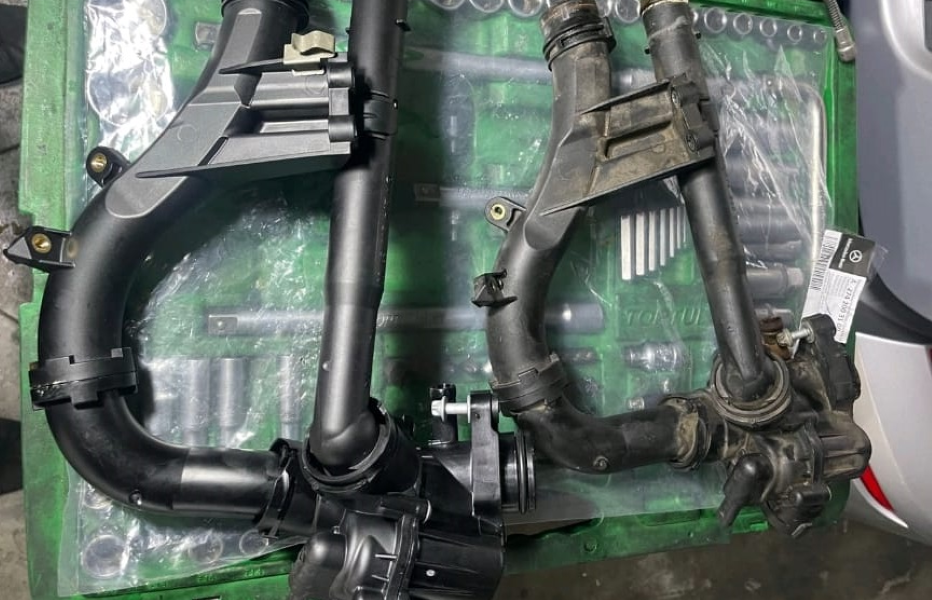

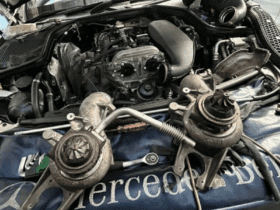
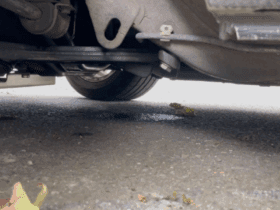


Leave a Reply